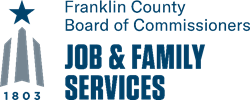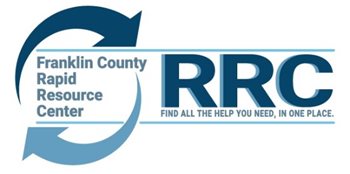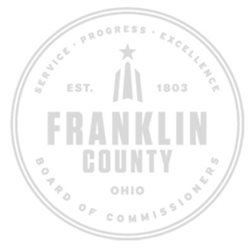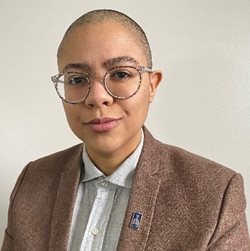A WELCOME FROM COMMISSIONER O’GRADY

Hello, and welcome to the March edition of our Commissioner Connection newsletter. In this edition, you’ll read about a new county program aimed at providing support to young men of color as they navigate their teen years and into the working world or on to higher education, an initiative that helps people who are getting out of jail to reenter their normal lives successfully, and a profile of another stellar member of our Board of Commissioners’ staff.
There’s also a highlight of one of my favorite programs from last year in which we partnered with the Columbus Fashion Alliance to fund craftspeople in Central Ohio who made masks for their low-income neighbors to wear during the pandemic. It’s been a full year now since we first started living in the new pandemic reality, and I know that a lot has changed for a lot of people. Much of it has been very difficult.
My colleagues and I feel that. We’ve experienced some of it ourselves, and we have worked very hard over the past twelve months to support our Franklin County neighbors and businesses, and to ensure that your county government is working smoothly for you despite the new challenges. Last year, we distributed more than $76 million in CARES Act funding to help our residents cope with our changing reality, health challenges, and business closings. (You can read about that in more detail here.) For 2021, we’re already working to continue our support for neighbors who are struggling in the pandemic economy. A few weeks ago, we rolled out $2.5 million in rental and utility assistance, and we’re planning for an additional $10.5 million in the coming weeks.
To celebrate Black history month in February, it was a great pleasure to host a series of special guests at our weekly General Session meetings. Keisha Gibbs of the Columbus Metropolitan Library told us about how the library system was celebrating Black History Month and how residents can get involved. Demetries Neely visited to let us know about everything going on at the King Arts Complex in February, and Lyn Ford spoke about how the Ohio Alliance for Arts Education was celebrating. Lastly, we were proud to welcome representatives from the Pleasant Litchford family to tell us about how land belonging to this former slave would eventually form part of present-day Upper Arlington, and Commissioner Boyce hosted a virtual townhall meeting with special guests and all three commissioners to talk about The Cost of Racism. (You can watch these presentations by clicking the links above.) We have been enjoying a full slate of Women’s History Month guests in March, and you can find these and other videos of our meetings at the Board of Commissioners’ YouTube channel.
Thanks so much for taking the time to read our newsletter. Being a county commissioner is such a challenging, but also fulfilling job, and my colleagues and I are excited to be able to share what we do with you.
Stay healthy and well,

John O’Grady, Franklin County Commissioner
COMMISSIONERS’ NEW FAMILY STABILIZATION UNIT TO SUPPORT BOYS AND YOUNG MEN OF COLOR
 Franklin County is the largest county in Ohio, but also one of the most racially and economically segregated. Boys, and especially non-white boys, face additional challenges growing up, lack access to resources that might help them reach their potential, and experience disproportionately negative outcomes in education and employment.
Franklin County is the largest county in Ohio, but also one of the most racially and economically segregated. Boys, and especially non-white boys, face additional challenges growing up, lack access to resources that might help them reach their potential, and experience disproportionately negative outcomes in education and employment.
Black students are three and a half times more likely to be suspended than their white peers, and while Black boys make up just 17% of our county’s youth population, they make up 25% of young people in the Truancy Diversion Program. Statewide, African-Americans make up just 12% of the population, but 45% of the prison population.
It is within this context that the commissioners created the Family Stabilization Unit (FSU), a two-year pilot program to provide wraparound support for families of low-income boys in order to help them successfully navigate the challenges of a complex human services system. A first-of-its-kind program, the unit will tailor its approach to meet the unique needs of each family, taking social determinants of health and racial equity into account, and is beginning with young men of color who are involved in the justice system.
Statistically, we know that such young men are likely to experience negative effects of their contact with the justice system throughout their lives. By using a holistic, multi-generational approach to assess the needs of an entire household, and connect it with available social services resources, the FSU team will be able to help address the root causes of some negative outcomes rather than simply responding to the symptoms.
They’ll stay engaged with the youth and their families for the long-term, helping them to navigate a complicated system to get their needs met so that the young people can improve their long-term opportunities for success. In addition to connecting families with resources and helping them navigate the social services system, the FSU can also provide direct services such as mentoring, employability training, connection to mental health resources, or housing.
The new Family Stabilization Unit is a partnership with the National African American Male Wellness Agency, and coordinated by the commissioners’ Job and Family Services agency. The FSU team collaborates closely with the courts, primarily through Juvenile Court’s Truancy Intervention and Prevention Program, and other governmental and social services agencies. In the first two months of operation, the Family Stabilization Unit engaged with more than 170 families. You can learn more about the program here.
HELPING JUSTICE-INVOLVED RESIDENTS MAKE A SAFE AND PRODUCTIVE TRANSITION BACK TO THEIR NORMAL LIVES
 The new James A. Karnes Correction Center is nearing completion on the west side of Franklin County and should be operational within a year. In the meantime, the county operates two jail facilities that take in more than 20,000 inmates each year.
The new James A. Karnes Correction Center is nearing completion on the west side of Franklin County and should be operational within a year. In the meantime, the county operates two jail facilities that take in more than 20,000 inmates each year.
An average stay at the jail may be several weeks, and a typical stay is more like a few days, but the vast majority of inmates in the Franklin County jail will be returning to their normal lives soon. Unfortunately, that isn’t always an easy transition. For inmates who don’t have a reliable place to stay, release from jail can be fraught with concerns about safety, transportation, and access to critical supportive services, and many are leaving our care without access to other basic necessities like food, clothing, health or mental health care, reproductive services, and hygiene items.
Unless detainees plan ahead for another option, it can also be easy to immediately fall back into unhealthy habits. In 2019, more than 150 of our neighbors died of accidental drug overdose within a year of being released from jail. To meet these needs, the commissioners’ Office of Justice Policy and Programs has partnered with the Franklin County Sheriff’s Office to create the Rapid Resource Center.
The Rapid Resource Center is a welcoming space near where detainees are released at the Jackson Pike jail facility, and open and staffed from 8:30 a.m. to 10:00 p.m. six days per week. The center is promoted on televisions inside the jail and inmates are encouraged to visit the Rapid Resource Center when they leave. People who are visiting or picking up an inmate are also encouraged to visit and to use the resources available there. The space is meant to be friendly and welcoming, with comfortable seating, coffee, and phone chargers.
At the Rapid Resource Center, staff from the Columbus and Franklin County Public Health Departments, PrimaryOne, Southeast Healthcare, and the commissioners’ office can help the newly-released inmates develop plans for transitioning back to the community. They can provide referrals and linkage to health, mental health, and addiction treatment options, as well as a Narcan kit to prevent overdose deaths. They can also help clients apply for benefits, obtain a birth certificate, and connect to emergency food or shelter, or link them to resources such as how to get a drivers’ license reinstated, or where to find job readiness training or new job listings.
The Rapid Resource Center has only been open for a few months, but already plans are in the works to expand, including with new transportation options, longer hours, peer support, and by opening a new Rapid Resource Center at the new jail when it opens. The transition from incarceration back to the community can be a tough one, but we can help make it easier and safer with a little support. Successful transitions can reduce the incidence of overdose deaths in the months after release, as well as reducing the chances that an inmate will find themselves in the county jail again in the future.
COMMISSIONERS’ ESTABLISH RACIAL EQUITY AS A CORE PRINCIPLE OF GOVERNANCE
 Last November, the commissioners voted to add Racial Equity to their list of fundamental principles for good governance. This list, including community safety and security, job creation and economic development, health and human services, environmental sustainability, and fiscally responsible government guides the commissioners and their staff as they set county policy and work to serve our residents.
Last November, the commissioners voted to add Racial Equity to their list of fundamental principles for good governance. This list, including community safety and security, job creation and economic development, health and human services, environmental sustainability, and fiscally responsible government guides the commissioners and their staff as they set county policy and work to serve our residents.
The commissioners have long worked to ensure that everyone in our community is able to join in its success, including by promoting racial equity, inclusion, and diversity in all aspects of county government, and they have taken a number of concrete steps in recent years to further that goal. In 2018, the board commissioned the Rise Together Blueprint for Reducing Poverty, which brough together hundreds of residents living in poverty with experts from the Central Ohio social services community to create a plan to help all of our residents thrive. That plan includes 13 large goals in the areas of Jobs, Housing, Health, and Youth, and more than 120 action steps to help make those goals a reality.
In recent years, the commissioners have also created an economic and inclusion taskforce, a construction inclusion team to ensure that the workforce and suppliers building county facilities reflect the community, and an office to support disadvantaged businesses seeking to work with the county, and instituted racial equity training requirements for county leadership and partners. Earlier this year, the commissioners also declared racism to be a public health crisis, and noted its effect on health, housing, education, employment, and criminal justice.
In addition to establishing racial equity as part of the commissioners’ core principles, the resolution also pledges to:
- Disrupt poverty by seeking to proactively advance racial equity.
- Collaborate with residents, community partners and institutions to promote racial equity in all areas of government, education, criminal justice, health, housing, and economic success to increase the value of services provided to the community.
- Commit to creating and sustaining an organizational culture that applies equity principles internally in order to end disparities in hiring and promotions.
- Increase opportunities in contracting and access for funding to minority businesses.
You can learn more about the commissioners’ commitment to racial equity here.
SPOTLIGHT ON A COUNTY EMPLOYEE —Carolina Trindade

The Franklin County Commissioners have long championed equity and inclusion; county policies have been inclusive of the LGBTQ community for years, and the commissioners work to ensure that their staff reflects the community and that county services are delivered fairly.
In recent years, however, they’ve been even more intentional and vocal about the changes they think our community needs in order for it to truly be a place where all residents have the opportunity to succeed regardless of their zip code, race, gender, religion, or immigration status.
That includes recognizing racial inequities as a factor in poverty and racism as a public health crisis, as well as making equity one of their core principles for governance, and it includes hiring
Carolina Trindade to be their diversity, equity, and inclusion administrator.
Thanks for taking the time to talk with us today about what you do for the county, Carolina. Tell us a little about yourself, where you come from, and how you came to be in the position you’re in now.
I lived all over the place when I was young—my dad was a minister, and we moved to lots of places, including Brazil for a while, but I’d say I mostly grew up in Southern California. I eventually moved to Virginia and went to Liberty University, and then to Columbus, where my first job with the county was at Job and Family Services. I got to participate in the Emerging Leaders Program and experienced great mentoring, including from Deputy County Administrator, Joy Bivens. In 2017, I moved to Human Resources, and started as the Diversity, Equity, and Inclusion Administrator in November of 2020.
Tell us a little about your work in Diversity, Equity, and Inclusion. What does that mean and what does it look like?
It starts with the commitment that the commissioners and county administration have to equity. That’s a huge deal, and it’s what makes everything else work.
I think there are three parts to the commissioners’ work in this area. First is the Office of Diversity, Equity, and Inclusion for Procurement, which recognizes that small, and woman and minority-owned businesses are a tremendous part of our local economy and that we should do even more to ensure that they are well represented in county contracts. Under the direction of our Chief Economic Equity and Inclusion Officer, they work to support and encourage small and emerging companies in doing business with the county. Then there’s the diversity, equity and inclusion administrator, which is me. I work to integrate the principles of equity and inclusion into all that we do at the Board of Commissioners, and I’m heading the Racial Equity Council, which is the third part of our work. The Racial Equity Council is made up of 28 members of the BOC team from throughout the office. We’ve formed work groups, and are developing recommendations and measurable objectives. The idea is to apply the equity and inclusion lens recruiting, learning and development, programming, and service delivery.
Equity is obviously a big focus for the commissioners. Why do you think that is, and why do you think it’s important?
It really does come straight from the commissioners. Commissioner Boyce talks about how historic policies have shaped our current reality, and that it takes just as much intentional policy to change it. Commissioner O’Grady is adamant that this isn’t something that we can tiptoe around anymore, and Commissioner Brown has said that making the changes we want to see in our own culture and in our community will require concerted effort from all of us. I think they recognize that a thriving community such as ours is not actually successful until everyone has the opportunity to share in that success. Making the changes that we want to see is not just about doing better now than we did before, but it requires changing the interconnected systems and the structures that are keeping our community from reaching its potential.
What’s a typical day like for you, and how has the pandemic affected your work?
Like a lot of folks, I guess, I feel like I don’t have typical days. I get to spend a lot of time advising our community partners and sitting in advisory roles with them. I work with colleagues on strategic planning for the Equity Council, external partnerships, and beyond. When the pandemic hit a year ago, though, I was still the senior HR administrator, and we had to make such a fast pivot to help transition so many people to working from home. It’s important for Human Resources to provide continuity and consistency for employees, and to be responsive both to the employees and the administration. In addition to the employees who were suddenly working from home, we also worked hand-in-hand with the employees whose work can’t be done from home, helping to keep them safe on the job. The county’s front-line staff are really the heroes of the pandemic to me.
What do you like best about your job?
It’s got to be the opportunity to work with brilliant colleagues who are committed to providing the best possible service to our residents. I learn something new every day from them.
What’s the hardest part of your job?
It can be taxing on your mental health, especially when you have different lived experiences in the diversity and inclusion space. I’m very intentional about caring for myself and my mental health. The pandemic is already taking a toll on all of us, but we don’t know yet what that may look like in the long run. So, I always encourage people to make their mental health a priority, and I really appreciate the opportunities to do that that the county provides.
What do you wish more people knew about what you do?
I want to encourage people to explore the issues surrounding diversity and inclusion. This isn’t something confined to one person or group of people. It’s about what we want our community and workplace to look like, and I encourage everyone to be a diversity and inclusion officer in their own spaces. It’s important that we have the uncomfortable conversations, but also that we be kind. This is how we begin to create a culture of inclusion and belonging.
Anything fun your coworkers don’t know about you yet?
When I lived in Southern California, I had the opportunity to work as a professional musician. I was in a ska band, and did background vocals, saxophone, and guitar for all kinds of music. It was a blast while it lasted.
FRANKLIN COUNTY LOOKING GOOD WHILE STAYING SAFE
 Last September, with our community in the throes of the pandemic and local businesses suffering in the worst economic environment in decades, the commissioners allocated $329,000 for an innovative new program to support local small businesses and their employees even as they supported our community. The initiative was a partnership with the Columbus Fashion Alliance to engage local fashion designers and garment makers to produce thousands of face masks that were then distributed for free in low-income communities across the county.
Last September, with our community in the throes of the pandemic and local businesses suffering in the worst economic environment in decades, the commissioners allocated $329,000 for an innovative new program to support local small businesses and their employees even as they supported our community. The initiative was a partnership with the Columbus Fashion Alliance to engage local fashion designers and garment makers to produce thousands of face masks that were then distributed for free in low-income communities across the county.
The Fashion Alliance branded the effort Slay Safe, and worked with primarily minority designers, textile companies, sewers, and vendors to support their struggling enterprises and get high-quality, high-fashion masks into the hands of under-served residents. You can watch a great video about the program here.